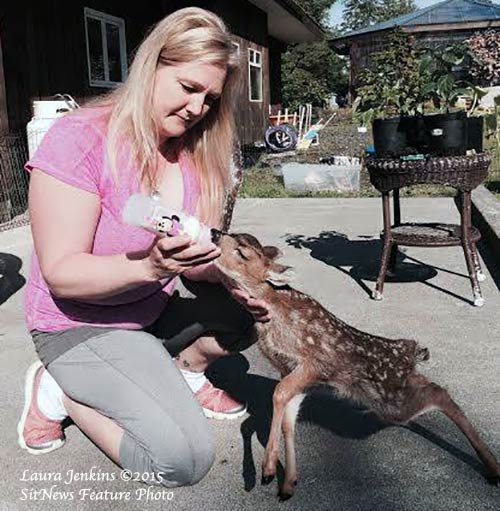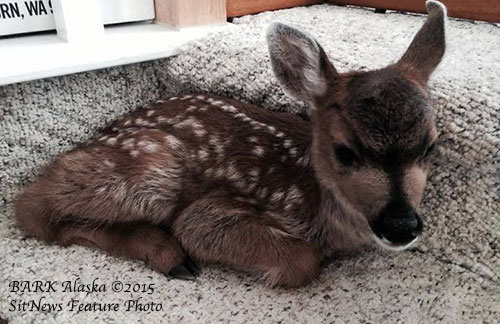
Rescued Fawn Reported to be Thriving in New HomeBy MARY KAUFFMAN
June 16, 2015
The fawn was discovered early Sunday morning by a Good Samaritan in the Ward Cove area. Gretchen Moore, owner of BARK Alaska Rescue, told SitNews the concerned citizen knew immediately that something was wrong and after looking for the doe unsuccessfully, the fawn, which still had the umbilical cord attached, was taken to the rescue center for urgent care. Moore immediately contacted the appropriate officials from the Alaska Department of Fish & Game who evaluated the care being provided by BARK Alaska for the fawn. Being satisfied with the fawn's care, the officials left the fawn in Moore's care until other arrangements could be made.
The orphaned fawn, Fern, is being fed by Gretchen Moore, owner of BARK Alaska.
Moore said the fawn, which they named Fern, was very hungry and feeding began slowly so as not to let Fern drink too much at one time and gradually increased. Moore said Fern won everyone's heart immediately bringing even big hunter-men to their knees in adoration and awe. When she arrived she was weak and thin said Moore. "We have no idea how long she had gone with out eating. She cried a lot, searching for anything that she could nurse on. She took to the bottle right away. I fed her small amounts to start. I did not want to give her a tummy ache. She pooped on me a few times. I made her a special pen with privacy. I know she was content when her eyes were bright and her nose shined." A deceased doe had been discovered in the same area approximately a day before but no fawn was located after an intensive search, Moore learned later. Moore said she was extremely thankful for the aid provided by Alaska Department of Fish and Game officials which made the rescue a possibility, Moore said BARK Alaska only cared for Fern for about 30 hours but that time was very critical in getting the fawn's strength up while a search was underway for a more permanent solution. Fern left Ketchikan Monday on her way up north to the Alaska Conservation Center where she will be provided the opportunity to grow up safe and cared for. Moore received a phone call today letting BARK Alaska know that Fern had safely arrived at the Alaska Conservation Center and is doing very well. Reports are that Fern is following the staff around and is in excellent condition. Moore said she could not thank the Alaska Department of Fish & Game enough for graciously working so hard with everyone to place Fern in a rescue. "It was a very busy weekend of calling the proper people to insure Fern could go to a safe placement facility, although we sure do miss her," said Moore. According to the Ketchikan Humane Society's report on FaceBook, "We'd like to thank the Center for agreeing to take her, and we hope she grows up safe and happy. Her mother was killed on North Tongass and she was lucky to be rescued by a Good Samaritan," wrote the Humane Society in their public post.
Fern, Ketchikan's orphaned fawn...
Even when young animals truly are orphaned like Fern, according to the Alaska Department of Fish & Game, the best policy is to leave them alone. Do not attempt to feed or pick them up; this type of contact with animals is illegal and may result in a fine. The Alaska Department of Fish & Game reminds everyone that this is the season of wildlife giving birth. Newborn fawns, bear cubs and other wildlife young may be encountered nearly anywhere in Alaska – including in the cities and trails used for hiking and biking. Hikers, bikers, dog walkers and others are urged to keep a wary eye out for newborn wildlife and to not assume young animals found alone are orphaned. The Ketchikan Borough has a leash law, and pets must be kept on a leash when and and about. Loose dogs cause injure or kill the newborn or cause wildlife to feel threatened and act aggressively. Mother deer, bears, and moose (not in the Ketchikan area but other locations in Alaska) frequently walk out of sight from their young, cache them, or become separated from by fences or roads. Sow bears often send cubs up trees to wait before leaving to find food. In nearly all cases, the mothers return to their young. According to the Alaska Department of Fish and Game, mothers of newborn wildlife are often protective and attacks on people and pets are reported each spring in Alaska especially by mother moose. In the Ketchikan area and around Alaska , if a bear cub is encountered without its mother immediately in view, be alert because you may have walked between them. The best course of action is usually to back away and leave from the direction you came. Mother bears will protect their young if they feel threatened. If you observe a young animal that appears to have been left alone for an extended period of time, do not pick it up. Call the nearest Alaska Department of Fish and Game office. The number for Ketchikan's office is 225-2475. If the situation involves an immediate public safety concern, contact the Alaska State Troopers. There are reports of more does and fawns on the highways and roadsides in the Ketchikan area and folks are being asked by the Ketchikan Humane Society to drive with this in mind.
|
||

